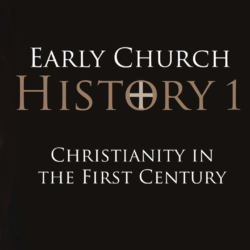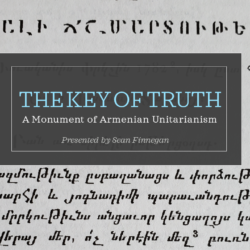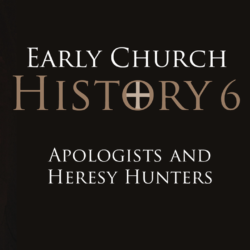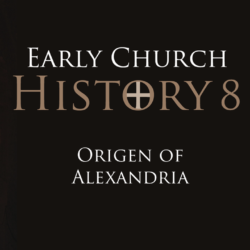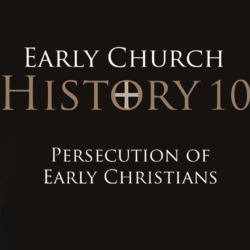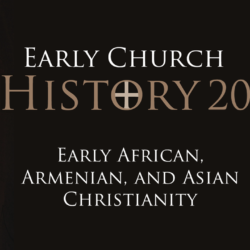This lecture covers the two main types of criticisms leveled against Christianity during the Enlightenment period: biblical and philosophical. In addition you’ll see how some Christians dug their heals in and worked hard to defend their faith while others gave ground but reinterpreted Christianity in a way that would not only survive the criticisms but also attract “cultured despisers.” We’ll conclude with a brief sketch of unitarianism in America.
This is lecture 13 of a history of Christianity class called Five Hundred: From Martin Luther to Joel Osteen.
All the notes are available here as a pdf.
—— Notes ——
Early Views of Biblical Inspiration
“The Holy Spirit did not simply inspire the meaning or sense of the words contained in Scripture, which the prophets and apostles then set forth, expressed, and embellished with their own words by their own will. The Holy Spirit supplied, inspired, and dictated the very words and each and every utterance to the writers.” –Johann Quenstedt (1623-1687)[1]
“The Hebrew Original of the Old Testament…is, not only in its consonants, but in its vowels—ether the vowel points themselves, or at least the power of the points—not only in its matter, but in its words, inspired of God” –Helvetic Consensus (1675)[2]
In the 18th c., we have Deism and Pietism.
In the 19th c., we have higher criticism and revivalism.
In the 20th c., we have secularism and Pentecostalism.
Enlightenment[3] (1650-1890)
- Not an organized movement but widespread current of thought
- Critical of superstition, enthusiasm, fanaticism, and supernaturalism
- Philosophy is no longer the handmaiden of theology but an independent field
- Though in France the Enlightenment was anti-Christian, it was embraced by Christians in other places like England and Germany
- Three phases (according to Alister McGrath)
- Demonstrating the rational nature of Christian belief (John Locke’s The Reasonableness of Christianity)
- Could derive Christian beliefs from reason alone
- Reason sits in judgment over revelation
- 1751 French Encyclopédie: multi-volumes covering all human knowledge and written by atheist Denis Diderot (1713-1784) and the Philosophes
Deism (17th-18th centuries)
- Revelation, ritual, and traditional practices minimized or written off as superstitious
- Clergy criticized for
- Keeping people in bondage
- Monopolizing truth using their authority
- Freedom to inquire and religious toleration
- Essence of religion is morality expressed in universal principles
- Idea that all religions contained the same basic moral precepts
- 1738: Pope Clement XII denounced Deism
- Thomas Jefferson (1743-1826)
- Cut miracles out of the gospels[4]
- Benjamin Franklin (1706-1790)
Philosophical Criticisms of Christianity
- 1656 – Baruch Spinoza (1632-1677) excommunicated from Talmud Torah congregation
- 1777 – Dialogues Concerning Natural Religion by David Hume (1711-1778)
- Only have knowledge of what we directly experience (empiricist)
- Cannot determine cause from effect (the world does not point to a creator)
- Miracles were made up, based on hearsay, or the result of ignorance of natural laws
- 1781 – Critique of Pure Reason by Immanuel Kant (1724-1804)
- Can only know things as we experience them, not what they truly are
- Can’t use reason to prove something external exists
- 1841 – The Essence of Christianity by Ludwig Feuerbach (1804-1872)
- No transcendent dimension to reality (what you see is what you get)
- Religion is just projection of human values
- 1848 – The Communist Manifesto by Karl Marx (1818-1883)
- Strongly influenced by Feuerbach’s theory of alienation
- If we change society, beliefs will follow (rather than beliefs creating society)
- Marx wrote: “Religion is the sigh of the oppressed creature, the heart of a heartless world, and the soul of soulless conditions. It is the opium of the people. The abolition of religion as the illusory happiness of the people is the demand for their real happiness. To call on them to give up their illusions about their condition is to call on them to give up a condition that requires illusions.” (Critique of Hegel’s Philosophy of Right)
- 1882 – The Gay Science (or “The Joyous Wisdom”) by Friedrich Nietzsche (1844-1900)
- Since God doesn’t exist, we must make up our own system of values.
- Will to power is the single driving force
- Proclaimed the death of God in his Parable of the Madman:
“Have you not heard of that madman who lit a lantern in the bright morning hours, ran to the market place, and cried incessantly: “I seek God! I seek God!”—As many of those who did not believe in God were standing around just then, he provoked much laughter. Has he got lost? asked one. Did he lose his way like a child? asked another. Or is he hiding? Is he afraid of us? Has he gone on a voyage? Emigrated? —Thus they yelled and laughed.
The madman jumped into their midst and pierced them with his eyes. “Whither is God?” he cried; “I will tell you. We have killed him—you and I. All of us are his murderers. But how did we do this? How could we drink up the sea? Who gave us the sponge to wipe away the entire horizon? What were we doing when we unchained this earth from its sun? Whither is it moving now? Whither are we moving? Away from all suns? Are we not plunging continually? Backward, sideward, forward, in all directions? Is there still any up or down? Are we not straying, as through an infinite nothing? Do we not feel the breath of empty space? Has it not become colder? Is not night continually closing in on us? Do we not need to light lanterns in the morning? Do we hear nothing as yet of the noise of the gravediggers who are burying God? Do we smell nothing as yet of the divine decomposition? Gods, too, decompose. God is dead. God remains dead. And we have killed him.
“How shall we comfort ourselves, the murderers of all murderers? What was holiest and mightiest of all that the world has yet owned has bled to death under our knives: who will wipe this blood off us? What water is there for us to clean ourselves? What festivals of atonement, what sacred games shall we have to invent? Is not the greatness of this deed too great for us? Must we ourselves not become gods simply to appear worthy of it? There has never been a greater deed; and whoever is born after us—for the sake of this deed he will belong to a higher history than all history hitherto.”
Here the madman fell silent and looked again at his listeners; and they, too, were silent and stared at him in astonishment. At last he threw his lantern on the ground, and it broke into pieces and went out. “I have come too early,” he said then; “my time is not yet. This tremendous event is still on its way, still wandering; it has not yet reached the ears of men.”
Biblical Criticisms
- 1670 – Theological Political Treatise by Baruch Spinoza (1632-1677)
- Rejected Moses as author of Torah; said Bible has contradictions
- 1678 – Critical History of the Old Testament by French priest Richard Simon (1638-1712)
- Father of biblical criticism; proposed multiple authors for Pentateuch
- 1774 – G.E. Lessing (1729-1781) popularized ideas of H.S. Reimarus (1694-1768)
- Argued for a source behind the synoptic gospels
- Scholarship’s purpose is to reconstruct the historical Jesus
- 1827 – Heinrich Paulus published The Life of Jesus
- Did not believe in miracles; explained Jesus’ miracles away
- 1835 – David Friedrich Strauss (1808-1874) published The Life of Jesus Critically Examined
- Examined every story in the Gospels (1500 pages)
- Gospels as myth rather than history
- 1840s – Tübingen School flourishes under leadership of Ferdinand Christian Baur (1792-1860)
- Two early forms of Christianity fought for supremacy: Jewish (James & Peter) vs. Hellenistic (Paul); he dated NT documents based on how they fit into his theory
- 1859 – Charles Darwin (1809-1882), an agnostic, publishes On the Origin of Species by Means of Natural Selection, or the Preservation of Favoured Races in the Struggle for Life
- Proposed theory that different species came about by means of minor changes and natural selection; his theory required earth to be much older than Bible implied
- Social Darwinism: apply biological concepts of “survival of the fittest” to society
- 1878 – Documentary Hypothesis of Julius Wellhausen (1844-1918)
- Moses did not write first five books; rather, they were written by four authors (J, E, D, & P) and were woven together by a later redactor.
- Application of evolutionary thinking to the Bible
- 1881 – William Robertson brought Wellhausen’s idea into the Encyclopedia Britannica
- Caused huge controversy; lost his professorial chair for heresy
- 1890s – History of Religions School (Religionsgeschichtliche Schule)
- Tried to find parallels to other religions in history to disprove uniqueness of the Bible
- 1906 – Albert Schweitzer (1875-1965) published The Quest for the Historical Jesus: A Critical Study of Its Progress from Reimarus to Wrede
- Accused questers of remaking Jesus in their own image
- Jesus as apocalyptic prophet who thought kingdom was about to come
A Response: Fight Them (Using Their Own Weapons)
- 1695 – John Locke published The Reasonableness of Christianity
- Used Enlightenment thinking to prove Christianity true
- 1736 – English Bishop Joseph Butler (1692-1752) published Analogy of Religion Natural and Revealed, to the Constitution and Course of Nature
- Used probabilistic reasoning to convince Deists to come back to the faith
- 1802 – William Paley (1743-1805) published Natural Theology; or, Evidences of the Existence and Attributes of the Deity
- Watchmaker argument (universe is ordered so there must be an “Orderer”)
- 1874 – Charles Hodge published What is Darwinism?
- President of Princeton Theological Seminary said Darwinism was just atheism
- Defender of biblical infallibility
- 1887 – Benjamin B. Warfield (1851-1921) became president of Princeton Theological Seminary
- Defender of inerrancy; emphasized authoritative view of Bible
Another Response: Join Them (Liberal Protestant Theology)
- Rethink Christianity in light of modern thought
- Romanticism (1800-1850)
- A reaction against Enlightenment thought (scientific rationalism and reductionism)
- Focused on emotion, beauty, imagination, intuition, and limits of reason
- 1822 – F.D.E. Schleiermacher (1768-1834) publishes The Christian Faith according to the Principles of the Protestant Church
- Drew on Kant’s rejection of natural theology and focused on interior aspects of Christianity (experience not doctrine or ethics; subjective not objective)
- Reduced religion to a “feeling of absolute dependence” (universal to all humanity)
- Salvation is entering into Christ’s perfect God-consciousness
- 1852 – Albrecht Ritschl (1822-1889) taught faith based on value judgments, not facts about Jesus
- Kingdom of God as community of brotherly love; focus on Jesus’ ethics not miracles
- 1886 – Adolf Harnack (1851-1930) began publishing his History of Dogma
- Essence of Christianity: fatherhood of God, brotherhood of man, worth of each soul, love rather than law
- 1917 – Walter Rauschenbusch (1861-1918) wrote A Theology for the Social Gospel
- American Baptist, influential in Social Gospel Movement
Universities in America
- Wealthy businessmen poured money into universities both old and new (Ezra Cornell, John Hopkins, Cornelius Vanderbilt, Leland Stanford, James Duke, and John D. Rockefeller)
- 1839 – 51 of the 54 university presidents were clergymen.
- From 1870 only 2% attended; by 1930 it was 12%
- 1865 – Andrew Dickinson White, first president of Cornell, said purpose was to “afford an asylum for Science—where truth shall be sought for truth’s sake, where it shall not be the main purpose of the Faculty to stretch or cut science exactly to fit ‘Revealed Religion’”[5]
- 1886 – Harvard no longer requires students to go to chapel
Fundamentalist Movement
- 1910 – Booklets called The Fundamentals: A Testimony to the Truth start circulating.
- Contained 100 articles by leading Christian conservatives including B. B. Warfield, James Orr, H.C.G. Moule, and C.I. Scofield
- Rejected modernist theologians and liberal theology and embraced the following fundamentals
- Inerrancy of the Bible, verbal inspiration; deity of Christ; virgin birth; Christ was sinless; substitutionary atonement; bodily resurrection; ascension; bodily second coming; sin is real; God’s grace as source of salvation; church is God’s institution
- 1922 – Harry Emerson Fosdick (1878-1969) preached the sermon “Shall the Fundamentalists Win?” at NYC First Presbyterian Church
- 1925 – Scopes Monkey Trial in Dayton, Tennessee
- 1929 – J. Gresham Machen (1881-1937) led conservative withdrawal from Princeton and founding of Westminster Theological Seminary in Pennsylvania.
- 1932 – General Association of Regular Baptists formed from Northern Baptist Convention
- 1937 – Presbyterians split: Orthodox Presbyterian Church and the Bible Presbyterian Church
Unitarians
- 1774 – Theophilus Lindsey (1723-1808) left the C of E and founded first Unitarian church in England (Essex Street Chapel in London).
- 1782 – Joseph Priestly (1733-1804) published An History of the Corruptions of Christianity
- Rationalist: rejected personal devil & demons; thought birth narratives as later additions; believed Christ mistakenly interpreted Old Testament in some places
- 1792 – He immigrated to America.
- 1796 – First Unitarian Church of Philadelphia by founders directly encouraged by Priestly
- 1785 – James Freeman, a Unitarian, became the minister of King’s Chapel in Boston
- First Anglican Church in New England and the first Unitarian Church in America
- 1805 – Harvard gets its first Unitarian president, Henry Ware (1764-1845).
- James Freeman became a Unitarian because he had encountered ideas of Clarke and Priestly while at Harvard.
- Harvard College became training ground for Unitarian ministers.
- 1806 – Conservatives at Harvard split and formed Andover Theological Seminary.
- 1819 – William Ellery Channing (1780-1842) preached a sermon called “Unitarian Christianity” in Baltimore.
- Channing is noted for: publicly preached against the Trinity; preached against limited atonement; Scripture not authoritative; rationalistic natural religion
- 1825 – American Unitarian Association founded to link all Unitarian churches under one banner
- By 1850s, most congregational churches had split (in most cases Unitarians were the majority).
- 1836 – Ralph Waldo Emerson (1803-1882) wrote an essay called
- 1850s – Critique of American slavery
- 1961 – Combined Unitarians with Universalists (between 200,000 and 600,00 today)
[1] Tim Grass, Modern Church History (London: SCM Press 2008), p. 9.
[2] ibid.
[3] For more information on the Enlightenment consult the Stanford Encyclopedia of Philosophy article at http://plato.stanford.edu/entries/enlightenment/
[4]“In extracting the pure principles which he taught, we should have to strip off the artificial vestments in which they have been muffled by priests, who have travestied them into various forms, as instruments of riches and power to themselves. We must dismiss the Platonists and Plotinists, the Stagyrites and Gamalielites, the Eclectics, the Gnostics and Scholastics, their essences and emanations, their logos and demiurges, aeons and daemons, male and female, with a long train of … or, shall I say at once, of nonsense. We must reduce our volume to the simple evangelists, select, even from them, the very words only of Jesus, paring off the amphibologisms into which they have been led, by forgetting often, or not understanding, what had fallen from him, by giving their own misconceptions as his dicta, and expressing unintelligibly for others what they had not understood themselves. There will be found remaining the most sublime and benevolent code of morals which has ever been offered to man. I have performed this operation for my own use, by cutting verse by verse out of the printed book, and arranging the matter which is evidently his, and which is as easily distinguishable as diamonds in a dunghill. The result is an octavo of forty-six pages, of pure and unsophisticated doctrines.” (Letter to John Adams: October 13, 1813)
[5] Mark A. Noll, A History of Christianity in the United States and Canada (Grand Rapids: Eerdmans 2003), p. 366.
—— Links ——
- See all the episodes of Five Hundred: From Martin Luther to Joel Osteen.
- The three main textbooks for this class include:
- The European Reformations by Carter Lindberg
- The Radical Reformation by George Williams
- Modern Church History by Tim Grass
- Check out these other Restitutio historical podcasts
- Intro music: “District Four” by Kevin MacLeod. Licensed under Creative Commons: By Attribution 3.0 License.

